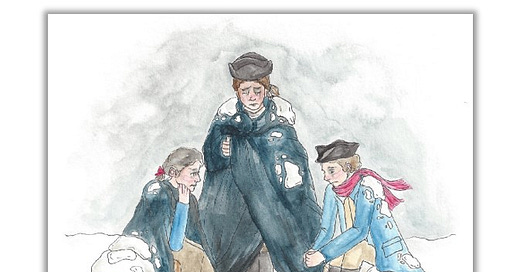TDIH: Connecticut's Valley Forge
The less famous Revolutionary War winter you haven't heard about.
On this day in 1779, American soldiers leave Redding, Connecticut. They had just endured a long, harsh winter encampment, as part of General Israel Putnam’s division in the Continental Army.
You know about Valley Forge and the difficult months that George Washington spent there, but do you know about this other, less famous winter? The encampment endured by Putnam and his men was just as difficult as the more famous one endured by Washington. It’s even been called “Connecticut’s Valley Forge.”
The men might have been miserable, but the location had been chosen carefully and was thought to serve several military objectives.
“[I]t would discourage the British from making another raid on the American supply depot at Danbury,” historian Robert E. Hubbard explains, “as they had done in April 1777. Also, it would provide a pool of about 3,000 troops that could be used to guard against and counter any raids that the British army or Loyalists might make along the New York-Connecticut border . . . .”
Putnam sought to keep the men busy, but they were becoming discouraged. They lacked blankets, clothes, and other basic necessities. They were broke, cold, and hungry—and they knew their families, back at home, were struggling without them.
Things came to a head on December 30, 1778. Some soldiers had simply had enough. They prepared to march to Hartford, where the colonial legislature was in session. They were armed with bayonets and seemed prepared to use them.
Fortunately, someone told Putnam. He ran for his horse, dashing toward the mutinous soldiers.
“My brave lads,” he exclaimed, “whither are you going? Do you intend to desert your Officers and to invite the enemy to follow you into the country? Whose cause have you been fighting and suffering so long in, is it not your own? . . . You have behaved like men so far—all the world is full of your praises—and posterity will stand astonished at your deeds; but not if you spoil all at last.”
His words calmed the men down. The ringleaders were taken into custody, although one man was shot as he attempted to escape. The rest were contrite and apologetic.
“We would Sincerly and humbly Acknowledge that we have been Guilty of [a shocking crime],” they petitioned Washington, “which justly Deserves the Frowns of the Genl and all the other Gentlemen, Who are Friends to Dicipline and Good Order in the army.” They asked for a pardon, promising that “the Genl may Depend on our fidelity and Good conduct, for the Future.”
Putnam also wrote Washington, asking for advice. Should he punish or pardon? He thought it dangerous to let such events go without a response, but he also knew the soldiers in question to be “sober, spirited, ambitious Young fellows of good families & educations, who have signalized themselves in action, & acquired the best reputations as Soldiers.”
In the end, the men were dealt with gently, but Washington advised Putnam that any insubordination in the future must be handled swiftly and the “severest and most summary example must be made of the Leaders.”
The rest of the winter wasn’t perfect. Putnam did have to handle a few instances of desertion and spying. At times, the soldiers got so hungry that they went foraging in local communities. Amazingly, though, his soldiers got through the winter, and the first regiments began emerging from winter quarters at the end of March.
They couldn’t then know it, but another miserable winter was just around the corner. Indeed, some thought the 1779-80 winter at Jockey Hollow was even worse than Valley Forge.
Naturally, that is a story for another day.
More nearly-forgotten stories of how our Founders sacrificed that we might have freedom.
Sources can always be found on my website, here.





Reading these nearly forgotten stories makes one thankful that such men lived and felt it was profitable to fight for freedom. They had vision beyond what they were facing and when some lost sight of it Putnam, a strong leader, reminded them of it. It’s a wonderful legacy that has passed down through generations. Looking forward to reading about Jockey Hollow, Tara.
The pain and suffering endured by our founding army cannot be fathomed in this day's life of excess. Even the poorest among us have access to food and shelter, however slight. We need to honor those who fought for the freedom we seem to take advantage of today.